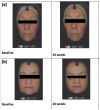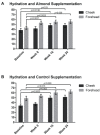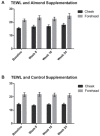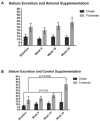Prospective Randomized Controlled Trial on the Effects of Almonds on Facial Wrinkles and Pigmentation
- PMID: 33673587
- PMCID: PMC7997170
- DOI: 10.3390/nu13030785
Prospective Randomized Controlled Trial on the Effects of Almonds on Facial Wrinkles and Pigmentation
Abstract
Background: Almonds have long been studied as a rich source of fatty acids, phytochemical polyphenols and antioxidants such as vitamin E. A recent study compared almond supplementations to a calorie-matched intervention for 16 weeks, yielding statistically significant improvement in wrinkle severity in postmenopausal women with Fitzpatrick skin types I and II that received almonds. This study furthers that assessment with a larger population and duration of 24 weeks to assess the influence of almond consumption on wrinkle severity, skin pigmentation and other skin biophysical profiles.
Objective: To investigate the effects of almond consumption on photoaging such as wrinkles and pigment intensity as well as facial biophysical parameters such as sebum production, skin hydration and water loss.
Design and interventions: A prospective, randomized controlled study assessed postmenopausal women with Fitzpatrick skin types I or II who consumed 20% of their daily energy consumption in either almonds or a calorie-matched snack for 24 weeks. A facial photograph and image analysis system was used to obtain standardized high-resolution photographs and information on wrinkle width and severity at 0, 8, 16 and 24 weeks. Measurements of transepidermal water loss (TEWL), skin pigmentation, skin hydration and sebum production were also completed at each visit.
Results: The average wrinkle severity was significantly decreased in the almond intervention group at week 16 and week 24 compared to baseline by 15% and 16%, respectively. Facial pigment intensity was decreased 20% in the almond group at week 16 and this was maintained by week 24. There were no significant differences in skin hydration or TEWL in the almond group compared to the control, although sebum excretion was increased in the control group.
Conclusion: The daily consumption of almonds may improve several aspects of photoaging such as facial wrinkles and pigment intensity in postmenopausal women. In conclusion, the daily consumption of almonds may contribute to the improvement of facial wrinkles and reduction of skin pigmentation among postmenopausal women with Fitzpatrick skin types I and II.
Keywords: aging; almonds; skin aging; tocopherol; vitamin E; wrinkles.
Conflict of interest statement
R.K.S. serves as a scientific advisor for LearnHealth and Arbonne and as a consultant to Burt’s Bees, Physicians Exclusive, Nutrafol, Abbvie, Leo, UCB, Sun and Regeneron Pharmaceuticals.
Figures







Similar articles
-
Soy Protein Containing Isoflavones Improves Facial Signs of Photoaging and Skin Hydration in Postmenopausal Women: Results of a Prospective Randomized Double-Blind Controlled Trial.Nutrients. 2023 Sep 23;15(19):4113. doi: 10.3390/nu15194113. Nutrients. 2023. PMID: 37836398 Free PMC article. Clinical Trial.
-
Prospective randomized controlled pilot study on the effects of almond consumption on skin lipids and wrinkles.Phytother Res. 2019 Dec;33(12):3212-3217. doi: 10.1002/ptr.6495. Epub 2019 Oct 1. Phytother Res. 2019. PMID: 31576607 Free PMC article. Clinical Trial.
-
Almond consumption increased UVB resistance in healthy Asian women.J Cosmet Dermatol. 2021 Sep;20(9):2975-2980. doi: 10.1111/jocd.13946. Epub 2021 Jan 24. J Cosmet Dermatol. 2021. PMID: 33491323 Free PMC article. Clinical Trial.
-
The Effects of Almond Consumption on Cardiovascular Health and Gut Microbiome: A Comprehensive Review.Nutrients. 2024 Jun 20;16(12):1964. doi: 10.3390/nu16121964. Nutrients. 2024. PMID: 38931317 Free PMC article. Review.
-
A Comprehensive Review of Almond Clinical Trials on Weight Measures, Metabolic Health Biomarkers and Outcomes, and the Gut Microbiota.Nutrients. 2021 Jun 8;13(6):1968. doi: 10.3390/nu13061968. Nutrients. 2021. PMID: 34201139 Free PMC article. Review.
Cited by
-
Health Benefits Related to Tree Nut Consumption and Their Bioactive Compounds.Int J Mol Sci. 2021 May 31;22(11):5960. doi: 10.3390/ijms22115960. Int J Mol Sci. 2021. PMID: 34073096 Free PMC article. Review.
-
Perspective: Challenges and Future Directions in Clinical Research with Nuts and Berries.Adv Nutr. 2023 Sep;14(5):1005-1028. doi: 10.1016/j.advnut.2023.07.010. Epub 2023 Aug 2. Adv Nutr. 2023. PMID: 37536565 Free PMC article.
-
Functional Foods in Dermatology.Dermatol Pract Concept. 2023 Oct 1;13(4):e2023256. doi: 10.5826/dpc.1304a256. Dermatol Pract Concept. 2023. PMID: 37992371 Free PMC article. Review.
-
Soy Protein Containing Isoflavones Improves Facial Signs of Photoaging and Skin Hydration in Postmenopausal Women: Results of a Prospective Randomized Double-Blind Controlled Trial.Nutrients. 2023 Sep 23;15(19):4113. doi: 10.3390/nu15194113. Nutrients. 2023. PMID: 37836398 Free PMC article. Clinical Trial.
-
Ex vivo Evaluation of a Liposome-Mediated Antioxidant Delivery System on Markers of Skin Photoaging and Skin Penetration.Clin Cosmet Investig Dermatol. 2024 Jun 21;17:1481-1494. doi: 10.2147/CCID.S461753. eCollection 2024. Clin Cosmet Investig Dermatol. 2024. PMID: 38933604 Free PMC article.
References
-
- Wolff E., Pal L., Altun T., Madankumar R., Freeman R., Amin H., Harman M., Santoro N., Taylor H.S. Skin wrinkles and rigidity in early postmenopausal women vary by race/ethnicity: Baseline characteristics of the skin ancillary study of the KEEPS trial. Fertil. Steril. 2011;95:658–662. doi: 10.1016/j.fertnstert.2010.09.025. - DOI - PMC - PubMed
Publication types
MeSH terms
Grants and funding
LinkOut - more resources
Full Text Sources
Other Literature Sources
Medical

